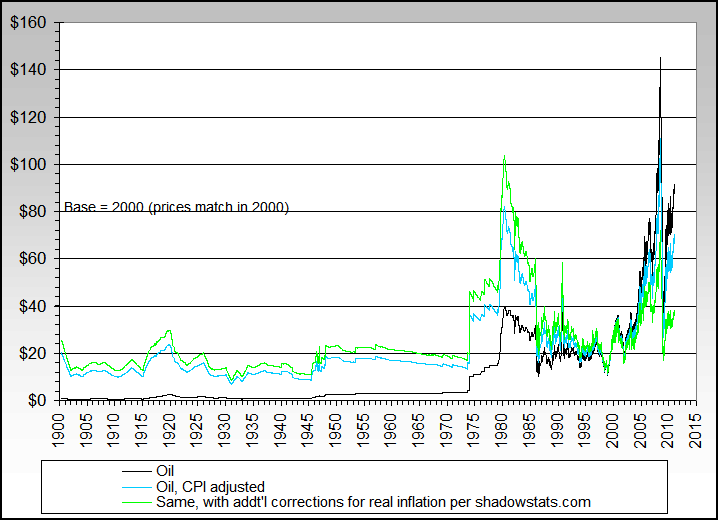Re: iTulip regards IMF chief economist's view of oil / inflation link as specious?
To highlight your concerns, I am linking to a very good article Growing Food When The Oil Runs out By Peter Goodchild
To highlight your concerns, I am linking to a very good article Growing Food When The Oil Runs out By Peter Goodchild
Most people in modern industrial society get their food mainly from supermarkets. As a result of declining hydrocarbon resources, however, it is unlikely that such food will always be available. The present world population is nearly 7 billion, but food supplies per capita have been shrinking for years. Food production will have to become more localized, and it will be necessary to reconsider less-advanced forms of technology that might be called "subsistence gardening."
The peak of world oil production ("peak oil") will be at some point in the early 21st century; it is quite possible that we are already past that event. The "peak" will be (or was) about 30 billion barrels of oil a year, but by 2030 annual production will be less than half that amount [2, 4]. Without oil and other hydrocarbons, there will be no fuel, no plastics, no chemical fertilizer. Alternative energy sources will do little to solve the problem [16]. Partly as a further consequence of declining oil supplies, electricity and metals will also be in short supply [8]. But in terms of daily life, the most important effect of oil depletion will be a shortage of food.
The effect of oil depletion on food is partly obscured by two separate but related issues: skyrocketing food prices and the great increase in biofuel production [6, 9, 10]. In the present chaos, however, to follow questions of money is to go on a wild-goose chase, while biofuel production can only be seen as a mad attempt to evade the problem of oil depletion while depriving the world of needed food.
.
.
.
The peak of world oil production ("peak oil") will be at some point in the early 21st century; it is quite possible that we are already past that event. The "peak" will be (or was) about 30 billion barrels of oil a year, but by 2030 annual production will be less than half that amount [2, 4]. Without oil and other hydrocarbons, there will be no fuel, no plastics, no chemical fertilizer. Alternative energy sources will do little to solve the problem [16]. Partly as a further consequence of declining oil supplies, electricity and metals will also be in short supply [8]. But in terms of daily life, the most important effect of oil depletion will be a shortage of food.
The effect of oil depletion on food is partly obscured by two separate but related issues: skyrocketing food prices and the great increase in biofuel production [6, 9, 10]. In the present chaos, however, to follow questions of money is to go on a wild-goose chase, while biofuel production can only be seen as a mad attempt to evade the problem of oil depletion while depriving the world of needed food.
.
.
.



Comment